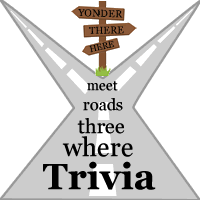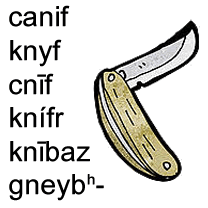
Here’s a recording in a mystery language.
Can you identify the language, and do you know where it’s spoken?

Here’s a recording in a mystery language.
Can you identify the language, and do you know where it’s spoken?

I learned the other day that the word trivia (insignificant trifles of little importance), comes from the Latin trivia, the plural of trivium – crossroads, public space, or literally “a place where three roads meet”. From trēs (three) and via (road, street, way, journey, march, passage, way method).
Apparently this term came to be used for anything commonplace. Also, beginners courses in universities used to be called trivium, and the word came be used to refer to things that are basic, simple or trivial [source].
The Latin word via comes from the Proto-Indo-European *weǵʰ- (to bring, to transport), which is the root of such English words as way, wagon, wain (as in hay wain), weigh, wag, vehicle, vector, voyage, obvious and devious [source].

When someone sneezes, you might say Bless you!, at least in English.
In Spanish, I discovered the other day, you say ¡Jesús!. A Welsh friend told me this, and another friend thought it sounded like the Welsh phrase Ga i sws? (May I have a kiss?).
In Welsh you might say Rhad arnat ti!/arnoch chi! (Bless you!), Bendith y Tad! (Blessing of the Father!) or Bendith y mamau! (Blessing of the mothers!).
In French you say À tes/vos souhaits ! (As you wish!).
In German you Gesundheit! (Health!)
What about in other languages?

Here’s a recording in a mystery language.
Can you identify the language, and do you know where it’s spoken?

Yesterday I discovered that the French word for penknife is canif [ka.nif], which was borrowed from the Middle English knif / knyf [kniːf] (knife, dagger) [source]. The English word knife comes from the same root.
Knif comes from the Old English cnīf [kniːf] (knife), which was possibly borrowed or influenced by the Old Norse knífr (knife), which comes from the Proto-Germanic *knībaz [ˈkniː.βɑz] (pincers, shears, knife), from the Proto-Indo-European *gneybʰ- (to pinch, nip), from *gen- (to pinch, squeeze, bend, press) [source].
Cnīf was first used in writing in the 11th century. Before then, seax [sæɑ̯ks] was the word for a knife or dagger, which is related to the word Saxon [source].
The French word for knife is couteau [ku.to], which comes from the Old French coutel, from the Latin cultellus (small knife, dagger), a diminutive of culter [ˈkul.ter] (knife, razor) [source], which is also the root of words for knife in Romance languages, the English words cutlass and cutlery, and the Welsh word cyllell [ˈkəɬɛɬ].
Today I added details of a two languages to Omniglot: Dhurwa (ପରଜି / धुरवा), a Central Dravidian language spoken in the states of Chhattisgarh and Odisha in eastern India; and Paresi (Haliti), an Arawakan language spoken in the state of Mato Grosso in central Brazil.
The total number of language profiles on Omniglot is now 1,300 – only a few less than the 7,000 or so languages currently spoken! The total is actually a bit higher as some pages include details of more than one language, but 1,300 is a nice round number.
So it’s unlikely I’ll run out of languages to add, but it is becoming increasingly difficult to find information, especially about how languages are written and pronounced. If you know where to find such details about any languages not already on Omniglot, do let me know.

Here’s a recording in a mystery language.
Can you identify the language, and do you know where it’s spoken?
What is the connection between buoys and oxen?
Well, the word buoy comes from the Middle Dutch boeye (float, buoy), from the Old French buie (fetter, chain), probably from Frankish *baukan (sign, signal), the root of the English word beacon, or from the Latin boia (a (leather) collar, band, fetter), from the Ancient Greek βόεος (bóeos – of ox-hide), from βοῦς (boûs – ox), from the Proto-Indo-European *gʷow- (cow) [source].
How do you pronounce buoy, by the way?
I pronounce it [ˈbɔɪ], as in boy, but I understand that some pronounce it [ˈbuːiː] or [ˈbui], like bwee.
In North Germanic languages such as Swedish, the word for cheese is ost, or something similar. Since I learnt this, I’ve been wondering where it comes from, so I decided to investige.
Ost comes from the Old Norse ostr (cheese), from the Proto-Germanic *justaz (cheese), from the Proto-Indo-European *yewH-s- (sap, juice, broth), from *yewH- (to blend, mix (food), knead).
From the same root we get the Latin word iūs (gravy, broth, soup, sauce, juice), from which we get the English juice, the French jus (juice), and the Welsh uwd [ɨ̞u̯d / ɪu̯d] (porridge, oatmeal).
Words for cheese in Finnic and Samic languages are also related: juusto in Finnish, juust in Estonian, and vuostá in Northern Sami.

Here’s a recording in a mystery language.
Can you identify the language, and do you know where it’s spoken?